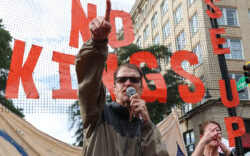Russian dissident Aleksei Navalny died in the cold confinement of a Siberian prison on Feb. 16. The longtime foe of Kremlin dictator Vladimir Putin lived a political prisoner’s life until he died a martyr’s death in a remote Arctic Circle lock-up in Russia’s dreaded Gulag prison system.
Navalny’s death in cruel captivity at the age of 47 set off protests around the world, and mourners brought flowers to hastily erected memorials across Europe and in the United States. In his home country of Russia, citizens braved the iron heel of Putin’s regime by carrying protests and remembrances into the streets of cities across that nation. Hundreds were arrested by Russian authorities in the aftermath of the dissident’s death. Some were dragged off to jail for merely leaving flowers at memorials for Navalny. In Moscow someone left a copy of Franz Kafka’s novel The Trial at an impromptu Navalny shrine in the city, an appropriate gesture since the 1925 novel is about an innocent man ensnared by a guilty bureaucracy.
Navalny himself had reread another appropriate novel while in prison, One Day in the Life of Ivan Denisovich, by Russian writer Alexander Solzhenitsyn. The somber tale is the story of a single day in the 10-year prison sentence of a Gulag inmate. Published in 1963 during the Cold War between Russia and the United States, the novel is relevant today as political prisoners languish in Russian jails while the country’s strongman, Putin, dreams of being a 21st century tsar over a new Russian empire. Today, Russia’s future under Putin could be expressed by the words of another sad novel, 1984 by George Orwell, in which he described the future under authoritarian rule as “a boot stamping on a human face—forever.”
The jackboot of tyranny has only made Navalny’s face known around the world. Though the dissident is dead, his wife has vowed to continue his work for human rights and against the kleptocracy of the Putin regime. Yulia Navalnaya is now a widow because her husband died in a Russian prison, but she has called on Russians “to come together in one strong fist and strike with it at this maddened regime, at Putin, at his friends and his bandits in uniform, at these thieves and killers who have crippled our country.”
In the years before his death, Navalny was poisoned and sprayed with green dye that almost blinded him. Still he continued to protest what he called “the swindlers and thieves” in the Kremlin. Amnesty International, an organization that aids political prisoners around the world, said that Navalny “demanded political freedom for himself and his supporters. He called out corruption and challenged Putin. His death is a devastating and dire indictment of life under the oppressive and stifling rule of the Kremlin. He paid the ultimate price for being a critical voice, and championing freedom of expression.”
After Navalny’s death in prison, the 2022 documentary titled Navalny was shown on American television. In the program, the determined dissident said, “You’re not allowed to give up… We don’t realize how strong we actually are.” Though the Putin regime had denied responsibility for Navalny’s death, the documentary’s director, Daniel Roher, fumed, “Of course they murdered him. It’s almost as if they had rented out a billboard to say to anyone else who thinks about being in the opposition, ‘This is what’s going to happen to you.’”
President Joe Biden and former President Donald Trump had markedly different responses to Navalny’s death. Biden placed the blame on “Putin and his thugs,” while Trump said nothing about Putin and compared his own legal troubles in America to Navalny’s plight in Russia, calling his criminal indictments “a form of Navalny” and claiming, “All because of the fact that I’m in politics, they indicted me.”
In 1977, in a column for the local Athens Observer newspaper, I wrote that activists in Russia “have endured a campaign of official harassment, imprisonment, exile and brutality that makes George Orwell’s 1984 seem not a chilling prophecy but a grim reality.” That grim Russian reality continues today, and Aleksei Navalny’s death proves again the truth of Martin Luther King’s warning that “Injustice anywhere is a threat to justice everywhere.”
Like what you just read? Support Flagpole by making a donation today. Every dollar you give helps fund our ongoing mission to provide Athens with quality, independent journalism.










